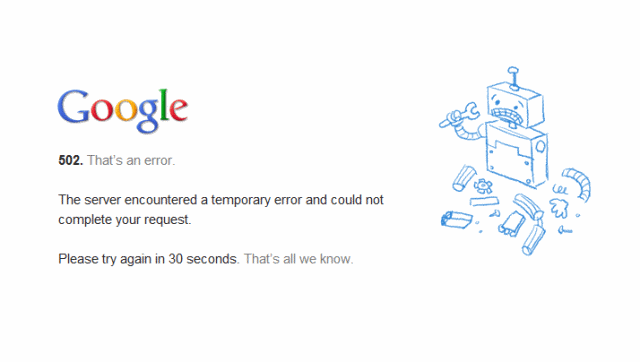It's The End Of The Week As We Know It

What are you doing this weekend? Sitting inside and moaning about the rain, probably. Here are a couple things to read in between your muffled sobs.
• Kanye’s ‘808s’: How A Machine Brought Heartbreak To Hip Hop
• Embrace Your Prairie Looks And Make Some Applesauce
• The Rogue, Undefeated, Reformed and Saved Sarah Palin
• The Fascinating Art On Show At The California State Bar Convention
A Poem By Kathy Fagan
by Mark Bibbins, Editor
Word Problem with Waves in Its Hair
There were 20 frittatas in that oven at any given time
They were little frittatas
There were starlings nesting in the wall beside the fridge
The knob on the oven looked like the combination lock to a safe
I desired to turn it in my hand like a curl in my mother’s hair
She took me to the beach when she wanted waves in mine
She wanted to put some body in it she said
She already had my brother in her
He was a guppy in her belly then & I her starfish all replaceable appendage
Shells thrilled me always filled with something brains or flakes off the moon
And jellyfish like the inside of an elbow
My mother liked her beach stones wet & her sand dry
A flashmob of Zsa Zsas on the busy lip of every cresting wave
But nothing not even the sun could make me squint like the sharp tips of her
glistening hair
The octopus has 8 arms she said 3 hearts
Octo 8 Carry the 3
Plus there are 2 sides to each horizon as there are to every wall
There were never frittatas in that oven
But she may have mentioned them once
When long straw & short straw were the verticals we made
Our different hair whipping greetings
Though our backs were to them all
Kathy Fagan is the author of four books of poems, most recently Lip.
If you’re in the market for more poetry — and, in these troubled times, who isn’t? — head right here, to The Poetry Section’s vast archive. You may contact the editor at poems@theawl.com.
Man Believes Momentary Neurological Event Somehow Reflects The Way We Think Now

So I was walking down the street last night when I was overcome by the most powerful wave of deja vu I have ever encountered in my life. Except it wasn’t exactly deja vu, it was a weird aggregation of other vus, which started with the feeling that I had been in this exact situation before, with the same people on the street, walking in the same patterns, and the same random stranger approaching another random stranger, but then it became more intense and bizarre. It seemed like a combination of things I had dreamed recently were brought to the forefront of my consciousness as real events, and it also coincided with my imagining things I have planned for the future as having already happened. (I know, confusing. And also about as exciting as listening to someone describe their dream. I’ll try to keep it short.)
I experienced symptoms that I most associate with descriptions of panic attacks: my breathing became labored and the corners of my vision became dark. I could only focus on a small circle in the center of my line of sight. However, I remained mobile. I did not lose the power of speech, as I distinctly recall saying, “What the fuck is happening?” aloud. My body continued to head downtown in the direction of the bar I was going to. So the rest of me was functioning fine, it was just a weird hiccup in my cranium. By the time I reached my destination I was a little sweaty and unstable (which is usually how you’ll find me in a bar, so I can’t make any assessments based on that) but pretty much recovered. There was still a deep feeling of unease, though, a kind of strange dread that I couldn’t quite characterize until this morning, when I sent a reply-all e-mail that should only have been a reply-to e-mail. In the seconds after I realized the mistake and frantically clicked “undo,” I felt that exact sensation of trepidation. My disquietude over my misfiring neurons took the shape of everyday Internet anxiety.
Anyway, my point: the eversion? It is absolutely happening. Everything is blending together. The distinctions between reality and the virtual are formless and void. Or maybe it’s just me. I should probably see one of them fancy brain doctors.
Photo by Jenny Downing, via Flickr
'Straw Dogs': 40 Years After The Original, It Still Sucks To Be A Man
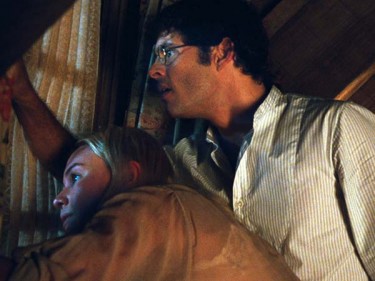
Whenever men have described to me what it’s like to be male, it sounds friggin’ awful — a nonstop blitzkrieg of Hobbesian brutality. Your life, as they depict it, is a war on two fronts: the front that wants to get laid, and will do whatever it takes to do so, and the front that must fight off other men. Both require totally different skill sets, and a loss on either shore is devastating. A friend told me that when he walks down the sidewalk, other (usually larger) men will step in his path to launch a game of Chicken, and they’ll slam into him unless he pulls away. (A guy did that to me once on Hudson Street — I shrieked like a cat in thumbscrews, called him an asshole, and two cops arrived in seconds.) Years of watching agro movies have only reinforced my view that it’s dreadful to be a guy. Dress him up in fancy clothes, give him a few Ivy League degrees and a gold AmEx, and the struggle to find his inner Thor only becomes more compelling. Which brings us to Straw Dogs.
If you know anything about this movie (no judgments if you don’t) you likely know that everyone’s bitching that it’s not as good as the 1971 original, which was made by Wild Bunch director and famed nihilist Sam Peckinpah. Call his version anti-feminist, call it exploitative: it’s been called both (and many other) names for years. But what holds up about his film is its visceral depiction of just how awful it is to be a “nice guy” who gets ripped in half by the opposing forces of civility and survival.
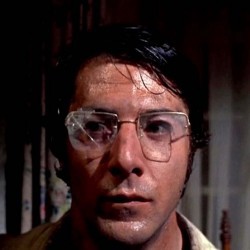
The simple reason the original is so good is Dustin Hoffman. No one is better at embodying an ostensibly effete intellectual harboring a fucking rage machine deep inside. Hoffman is emotive, he’s emotionally vulnerable and, well, there’s no polite way to say this — he’s small. Tiny, even. Which, in the chest-thumping department, is an automatic 40 handicap. There’s something baseline archetypal in the plight of a small man. His struggle is the struggle, the inescapable fight to triumph over one’s immutable circumstances. He can do whatever is in his power — obtain expensive degrees, make bank, build up intellectual capital — to raise his social valuation. But he’s never going to be the guy you veer away from on the sidewalk.
When you take this compelling a hero and plunk him down in extreme circumstances — specifically, into a rural town packed with locals who punch holes in his manhood (figuratively), rape his wife (unfiguratively) and attack his house, forcing him to unleash the Paleolith in a spray of plasmic carnage — well, you’ve got a great movie. Add a little Clockwork Orange-ultraviolence, and voila! a cult classic.
Then there’s the remake, which came to theaters last week. Critics are excoriating its mere existence, which seems pointless; the movie’s been made, and people are seeing it, so let’s quit bitching and discuss it on its merits. The fact is that despite its lack of Hoffman-ness (chiseled sensitivity aside, James Marsden is no Dustin Hoffman), this is a perfectly good remake. A loyal-to-the-point-of-lacking-all-imagination remake. In fact, the only real difference is that instead of the perfect hero, you have the perfect villain. Yup, I’m talking about Alexander Skarsgård.
The part Skarsgård plays here is Paragon Alpha, the man who can win on all fronts and serves as a boot in the ass to the socially softened hero. He evokes fear and respect in men while simultaneously compelling women to bang him (in Skarsgård’s case, perhaps literally; as the credits rolled, two lesbian friends declared themselves “willing to make an exception”). Skarsgård pretty much runs away with the role; he presents an Alpha that’s every bit as riveting as Hoffman’s beleaguered rabbit.
Beyond Skarsgård’s presence, the remake is little more than a carbon copy of the original, with some minor modernization and a change in setting. A Harvard atheist with Hollywood pedigree rolls his vintage Jag into a rural town and clashes (hard) with the local menfolk. That the setting has changed from rural England to the deep South adds a bit of cultural critique to the proceedings, as the Alpha Males mutate from British hoodlums to gun-toting, whiskey-swilling redneck clichés. But the rubric is the same; they’re all walking chunks of Id and Ego, creating violence in a violent paradigm. The hot blonde wife (Kate Bosworth, looking like she needs a sandwich) is once again merely a vehicle for the men to achieve domination over each other, and the central conflict still comes down to one bloody battle between a sensitive dude and five guys with guns. Which isn’t a knee-jerk bad-thing; with all due respect to my estrogen kin, there’s plenty to gain from an honest exploration of masculinity’s ugly underbelly.
And that’s the real point we can take from the remake; that decades after feminism entered the cultural mainstream, after we’ve slogged through all these social and gender reconfigurations, the Act of Being Male still stirs up the same shitstorm it always did. However much we’ve resocialized men away from blatant sexist norms (which we now fetishize with “Mad Men” et al), it still comes down to a simple test: How do you make do with whichever branch of the Masculinity Yggdrasil your ass happened to land on? In the movies, at least, there’s still one surefire way to measure a “man’s worth” — if he can defend his home and family from other men.
Straw Dogs gets three bloody chainsaws (out of five).



Melissa Lafsky, The Awl’s Horror Chick, wants to be scared by your movie.
Inside Last Night's Michele Bachmann Debate-Watching Party
by Abe Sauer
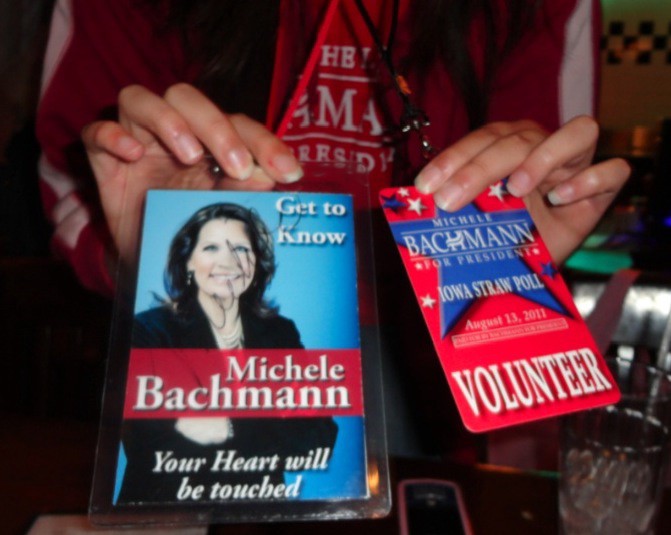
“Oh my God, who invited you?” That’s the first question Chelsea, the young woman with the Michele Bachmann event tag dangling from her neck, asked me when I told the Champps hostess I was here for the Fox News-Google GOP debate viewing party.
Chelsea is distraught, because Bachmann’s campaign might somehow be on the hook for the event’s food and drinks. “I don’t know who organized this. We don’t have any money for this,” she said, kind of having a small breakdown.
Bachmann’s former campaign manager had recently revealed that Bachmann’s operation is basically on life support — telling MSNBC that she “doesn’t have the ability or the resources to go beyond Iowa at this point in time.” After spending like a drunken sailor to win Ames, the only variation on her fundraising woes is the color words used by the press. The Times: “major headwinds.” Minneapolis Star-Tribune: “high hurdle.”
Chelsea will apologize through the evening for being “way too wired.” But she feels better when I show her the invite email I received: “Food/beverages are on your own.” I was invited, and so I came.
Relieved, Chelsea took me back to the empty mezzanine seating area where I and 25 or so Bachmann supporters will watch the Congresswoman’s performance. Together, we will come to one conclusion: “It’s like Perry was on drugs.”
The Maple Grove Champps Americana is not actually in Bachmann’s 6th Congressional district, but in Republican Erik Paulsen’s 3rd, which acts like a vertebral disc between Bachmann’s zone and the 5th — which is represented by not only a Democrat but the first Muslim Congressman, Keith Ellison. But it is appropriate we’re in Champps Americana, not only because it is a favorite local Minnesota chain (that most locals probably don’t know was bought by Colorado’s F&H Acquisition five years ago) but also because it’s a sports bar. That modern American politics are called “sport” is more than just a throwaway criticism.
As we waited, Chelsea explained to me how she “just goes wherever they send me,” referring to the campaign. She was in Iowa. She has no idea where she’ll go next. Asked why she’s such a Bachmann supporter, Chelsea told me it’s “because she’s what America needs right now.” I press: but what specifically? “What do you mean,” Chelsea said.
Before long, the table fills with others, many of who have, or continue to, work and volunteer for Bachmann. David Fitzsimmons, a tall man whose goatee boasts poorly protected borders, seems the most in touch with the current campaign, probably because he is chairman of the Republican Party in the Bachmann’s district. A former Ron Paul fan, Fitzsimmons is now behind Bachmann.
Three women join us: one prim in a trench coat, another sips white wine. Two men of a certain kind of Minnesota beefiness sit down: one wears a giant black cowboy hat, the other all Twins gear. Just before the debate begins, Scott Winer, manager of this Champps, and Rob Powell, Minnesota Senate District 32 Republican Party Co-Chair, sit next to me. Powell orders his second of three Guinnesses and, a day after Bachmann called food safety regulations “overkill,” I order a delicious mountain of nachos.

For a group brought together to watch the debate, the Bachmann supporters don’t stay very glued to the TV.
Bachmann fields her first question, about how much one should pay to taxes, and she lays a giant egg. “She just contradicted herself,” said Winer, sipping his drink.
“What’s that?” asked Chelsea.
“Jack Daniels and sour,” he said.
“Is that a beer?” asked Chelsea.
David, who is constantly checking his phone for tweets, sets the bar of lowered expectations. “These things are what they are.”
The first loud cheer of the night comes not for Bachmann but for Herman Cain’s promise to eliminate the EPA. “But didn’t he say that he’d then rebuild it?” worries the women in a “Michele Bachmann Homeschool Coalition” t-shirt.
If you have not yet read it, these debates offer the perfect opportunity to pick up Jim Lehrer’s latest, Tension City: Inside the Presidential Debates, from Kennedy-Nixon to Obama-McCain. Lehrer’s book appropriately bookends an era when questions for those running for the office came from a select group of elite broadcast journalists (except, as Lehrer points out, one Chicago Sun-Times editor).
For this debate, Fox invited users to submit questions via its (Google-owned) Youtube page. The questions chosen included those on immigration, gays in the military, Israel and the 10th Amendment. Coincidentally, one intriguing entry from Covington, LA that went unasked [all sic]: “I am currently in the 50% of Americans that are not required to pay Fed. income taxes. Dispite Mr. Buffet and Mr. Obama’s complaints, I feel this is unfair. Will you find a way to include ALL Americans, even me, into our tax system?” Your move, Mr. Buffett.
When the group wasn’t watching the debate, they were talking state politics and how Obama just simply must be defeated somehow. “You look at it, and they have the same-sized, same-looking houses. It’s a microcosm of socialism up there,” says the women drinking white wine, lamenting the inability of Republicans to gain traction in certain impoverished parts of northern Minnesota.
Obamacare. Goddamn Obamacare! If there was one thing everyone in this room agreed on, it’s that Obamacare has got to go. Winer nodded his head in agreement as each candidate took shots at Obamacare. His only criticism was of Romney’s technical answer involving an executive order to issue waivers to each state blah blah blah. He felt Romney’s answer seemed weak on Obamacare. “Just get rid of it,” he said. Business has not been good for Winer. “It is what it is,” he said of the weak economy. “My dream ticket is Chris Christie and Rubio.”
“What’s Obamacare about anyway?” said Chelsea.
“You know, I couldn’t even tell you,” said David, clearly able but unwilling.
Bachmann’s crew got rolling with the Congresswomen’s answer about education. It made for the first cheers of the night for her and energized everyone.
Bachmann lucked into the immigration question and said, among other things, that she would like to build a wall along every inch of our border. Her people love hearing her be tough on immigration. They like all the immigration stances except Perry’s. “I just don’t understand that. Makes no sense,” said the prim women in the trench, referring to Perry’s in-state tuition policy for “illegals.”
Big picture reports often paint Bachmann and Perry as very similar candidates. But that doesn’t seem right at all. The candidates these Bachmann supporters respond best to are Herman Cain and, in a few answers, Rick Santorum. The ones I speak with admit Newt is a legend, a major brain, worthy of respect (if not a vote). They even find Ron Paul and Gary Johnson adorably goofy and lovable.
The conventional wisdom might be that, once Bachmann’s gone, her evangelical base will fall in behind Perry. But this crowd seems more likely to give its vote to… Romney. With Perry already having sucked up all of the vacillating Bachmann fans, those diehards who are left see Perry as the greatest enemy in the field.
The HPV question finally comes home to roost and Bachmann backs off her original claims by dumping all the blame on the anonymous mother and then savaging Perry. “I think she did a good job actually,” said one woman, her white wine now gone.
“If somebody told her that story, then what’s she supposed to do?” lamented the women in the trench. “I mean, I should know if my child is having sex or not. It’s my choice.”
Of all the issues these Bachmann supporters could break with her on, somehow it’s her HPV vaccine claims. Another women leaned in and flatly said the vaccine is a good thing: “I even heard it’s for boys. They said boys can get it too.”
While Bachmann takes Perry to task as a Tea Party bandwagon jumper and crony capitalist, her public easing off on Romney is seen as a posture for a VP spot. Yet she kneecapped Romney at the pre-debate event with Ralph Reed’s new joint, the Faith And Freedom Coalition, when she implored social values conservatives not to settle and instead seek out a candidate whose values they “share.” (Coded message, received!) Bachmann banged away at this idea of not settling again during the debate, although with not quite a strong-enough evangelical pitch.
On his way out, the man with the big black cowboy hat waved goodbye and says that Perry clearly did the worst: “It’s like he was on drugs.”
Bachmann has time to dawdle and find a new play. She has missed about 53 percent of Congressional votes since she announced and has not held an event in her district anytime in recent memory.
“Ours is one of the most gerrymandered districts in the country,” said Bachmann’s fellow Stillwater resident Karl Bremer, an investigative journalist and co-author of the upcoming book The Madness of Michele Bachmann: A Broad-Minded Survey of a Small-Minded Candidate. While her district will be redrawn, probably by the courts, between now and February, if it remains anything like it is, Bremer says, “She would almost certainly win.” Bachmann has until the first week of June, 2012 to announce a run to hold her current seat. But with the GOP national convention not until September of 2012, she may be forced to decide before getting any vice-presidential nod, a goal a few of her supporters here grudgingly admit to in passing.
The table exploded in laughter. Everyone had jumped to huddle around David’s phone as he read Michelle Malkin’s tweet: “If Perry goes after Obama in debates like he just did against Romney, we’re screwed. Just saying.”
“Awesome,” they said. “So true.” And: “I love Malkin.”
“Wait, are you Michelle Malkin?” Chelsea asked the woman in the trench coat.
Abe Sauer can be reached at abesauer at gmail dot com. He is on Twitter.
Pharrell Compares Frank Ocean To Terrible Folk Singer
“To me, he’s like the black James Taylor.”
— Pharrell Williams insults rising R&B; star Frank Ocean, while trying to praise him.
Go Buy a Book in the East Village

The lovely St. Mark’s Bookshop is hoping for a $5000 reduction each month in their $20,000 monthly rent — and they expect to perhaps hear from their landlord, Cooper Union, today.
A reduction of $5000 a month! Why, that’s all of 250 purchases at a (very low) estimated average purchase price per customer of $20. (That would be eight customers a day.) I would describe that as a harrowing view into the store’s finances and costs.
"Syndication" and the Shoddy Currency of Linkage
My article about Business Insider has already had more than 3 times as many pageviews as Business Insider sent me since 2009.Fri Sep 23 16:09:36 via Twitter for Mac
Marco Arment
marcoarment
We wrote here a year-and-a-half ago about the new use of the term “syndication.” While that used to mean “getting paid by publications to reprint writing,” it has now come to mean “not getting paid by publications to reprint writing.” We wrote that some “sites, which make a good deal of money, now are trying to have two tiers of writers. There’s the ones they pay (some well, some less well) and then there’s everyone else, who now they don’t pay at all.” Instead, you get paid in a link.
Now, here’s an analysis by Marco Arment of what being “syndicated” in this way has meant to him — specifically, syndicated by Business Insider, which just took in $7 million in additional funding this week, which is, in my modeling, about $6 million more in funding than a healthy editorial property should be taking on. But Marco, who’s the developer of Instapaper, publishes his work under a Creative Commons license, so anyone can “syndicate” his work just with credit. His conclusion was that this syndication process was worth pretty much nothing to him. And then… Business Insider syndicated his critical post. And then they took it down. UPDATE: Pop some popcorn, because Business Insider swipes back! God, what did we used to do for fun before all these people and their WEB DRAMAS? I mean, probably we bought books at local bookstores that are going out of business.
Why Not Write Your Grandparents A Letter?
Why Not Write Your Grandparents A Letter?
by Spencer Lund
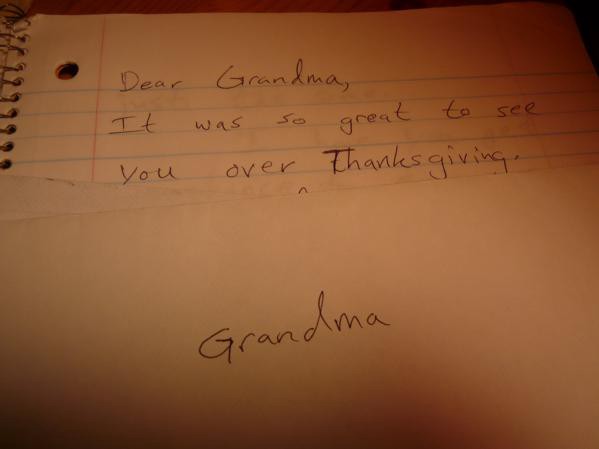
Can you remember the last time you wrote someone a letter? Maybe it was a college middle-school sweetheart, or you were in elementary school and responding to your Christmas and birthday presents. It’s possible you’ve just come back from your honeymoon, and you and your partner are grinding out thank-you notes for the presents. Or maybe you’re penning letter after letter to someone you loved and lost. You probably never even sent those letters (I hope you didn’t — real life is not The Notebook).
But chances are you may not remember what it feels like to sit down with a nice desk in front of you, some loose-leaf paper, a pen and only a slight idea what you’re going to say. It feels pretty good, especially if you’ve been popping Adderall, smoking cigs and going about your daily life without any time to reflect. Writing a letter is a nice way to unwind and let the obtrusiveness of jobs, commutes and social obligations fall by the wayside. Who should you write? Well, how about your grandma or grandpa?
Your grandparents, if you’re lucky enough to have any still alive, came of age in an era when there was nothing but the telephone, the telegram and USPS conveyance. One of those modes died and another might not be around much longer. (FedEx, for the record, was invented in the early ‘70s.) Some of your grandparents are happily on Twitter; some are grooving on Facebook; some don’t quite get texting yet. Your grandparent v. technology mileage will vary — but nearly all remember the delights of physical mail delivery in a way that people born in the ’80s just can’t understand. Here are some tips for writing your letter.
First thing, make sure you can still write. A lot of my friends have the penmanship of a doctor with cataracts, but with a little struggle the print letters you struggled to perfect in grade school should come back to you. Don’t even think about longhand. If you’re like me and trend towards a mash-up of cursive and print, then make sure you’re cognizant of your scribbling shortcomings (we all have them — my writing is also cramped). Don’t cop out and type it, even on a typewriter.
This is not the great American novel. Don’t overdo it. Your grandparents come from a time when people routinely read books and newspapers every day, and authors were famous regardless of their inclusion in Oprah’s Book Club. But just because their generation was more literary-minded doesn’t mean you need to write a Nick Adams vignette within your letter (although a fishing story might make your grandpa happy). Keep it simple and to the point, the main focus being your love for them.
I can’t comment for everyone’s grandparents, since they’re all different, but there is one trait they almost all share: Loving their grandchildren. That unconditional love may exist because they’re untrammeled by the vestiges of your adolescence (unless they raised you, in which case it might be more complicated). You’re their grandchild, so minor indiscretions are ignored or forgotten. No matter how many tattoos I got, or piercings, or how many times I dyed my hair growing up, my grandma always loved when I stayed with her and thought I was an angel even when the rest of the family did not.
Out of deference to this unbending love, try to focus on topics in your letter that will bring them pleasure. This is not a creative-writing exercise; the point is to let them know you’re thinking about them. Bring up the last time you were together. Focus on something you know they’ve always loved. For me it was the Miller Light that always sat next to my grandma at the dining-room table. A few years back someone ordered her a microbrew at a restaurant in the Bay Area, and she spat it out and asked the shocked waiter, “Can I get a real beer?” (I’m looking forward to Macro Brew jokes.) Sitting at your desk, grasping for memories long since misplaced, you’ll be surprised by how sweet and genuine these recollections may be. Your grandparents may have forgotten some of them too, and it will be a nice reminder for both of you.
Once you’ve successfully penned your letter, now it’s time to send it. Do you even have their address? Try to get it without calling your folks or a relative that lives nearby them. I’m assuming that for many of you this letter will be meant as a surprise (my first one was), so send it like you mean it and without the aid of others.
If you’re unfamiliar with how postage works these days, you should know that you now can purchase first-class stamps, “forever stamps,” that will always be the correct postage. Declining revenues mean the cost of sending mail is rising almost as fast your subway fare. These special stamps will always work, and your grandparent will get a letter from you, and you have no idea how happy this will make them.
My only remaining grandparent is reaching the end of her life. A lot of people would be uncomfortable with this notion, but not my grandma. She’s tougher than my family, and me, and she wouldn’t want any of us to shrink from the natural cycle of life. I’d like to think these letters remind her of all that she’s given to me (and others) over the years. She’s 60-plus years older than I am, and I’ll never be able to thank her enough for all the wisdom and humor and guidance she’s passed on to me. By writing to her about joyful memories we’ve shared in the past, I try to give her some joy and amusement in the present. And that’s what all of us want — regardless of age.
If you have a grandparent alive, send them a letter too. You won’t regret it.
Spencer Lund thinks you should write a letter to any grandparents you have left.

